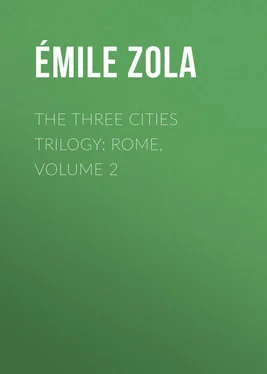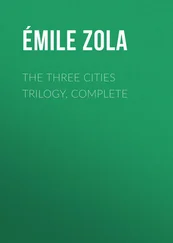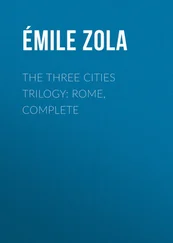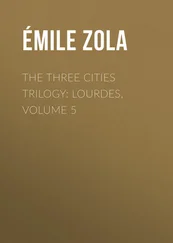Émile Zola - The Three Cities Trilogy - Rome, Volume 2
Здесь есть возможность читать онлайн «Émile Zola - The Three Cities Trilogy - Rome, Volume 2» — ознакомительный отрывок электронной книги совершенно бесплатно, а после прочтения отрывка купить полную версию. В некоторых случаях можно слушать аудио, скачать через торрент в формате fb2 и присутствует краткое содержание. Жанр: literature_19, foreign_antique, foreign_prose, на английском языке. Описание произведения, (предисловие) а так же отзывы посетителей доступны на портале библиотеки ЛибКат.
- Название:The Three Cities Trilogy: Rome, Volume 2
- Автор:
- Жанр:
- Год:неизвестен
- ISBN:нет данных
- Рейтинг книги:4 / 5. Голосов: 1
-
Избранное:Добавить в избранное
- Отзывы:
-
Ваша оценка:
- 80
- 1
- 2
- 3
- 4
- 5
The Three Cities Trilogy: Rome, Volume 2: краткое содержание, описание и аннотация
Предлагаем к чтению аннотацию, описание, краткое содержание или предисловие (зависит от того, что написал сам автор книги «The Three Cities Trilogy: Rome, Volume 2»). Если вы не нашли необходимую информацию о книге — напишите в комментариях, мы постараемся отыскать её.
The Three Cities Trilogy: Rome, Volume 2 — читать онлайн ознакомительный отрывок
Ниже представлен текст книги, разбитый по страницам. Система сохранения места последней прочитанной страницы, позволяет с удобством читать онлайн бесплатно книгу «The Three Cities Trilogy: Rome, Volume 2», без необходимости каждый раз заново искать на чём Вы остановились. Поставьте закладку, и сможете в любой момент перейти на страницу, на которой закончили чтение.
Интервал:
Закладка:
"But it is very nice, the view is superb!" declared Pierre, in order to please him. "I am for my own part very glad to see you, very glad to be able to grasp your valiant hands, which accomplished so many great things."
Orlando made a fresh gesture, as though to sweep the past away. "Pooh! pooh! all that is dead and buried. Let us talk about you, my dear Monsieur Froment, you who are young and represent the present; and especially about your book, which represents the future! Ah! if you only knew how angry your book, your 'New Rome,' made me first of all."
He began to laugh, and took the book from off the table near him; then, tapping on its cover with his big, broad hand, he continued: "No, you cannot imagine with what starts of protest I read your book. The Pope, and again the Pope, and always the Pope! New Rome to be created by the Pope and for the Pope, to triumph thanks to the Pope, to be given to the Pope, and to fuse its glory in the glory of the Pope! But what about us? What about Italy? What about all the millions which we have spent in order to make Rome a great capital? Ah! only a Frenchman, and a Frenchman of Paris, could have written such a book! But let me tell you, my dear sir, if you are ignorant of it, that Rome has become the capital of the kingdom of Italy, that we here have King Humbert, and the Italian people, a whole nation which must be taken into account, and which means to keep Rome – glorious, resuscitated Rome – for itself!"
This juvenile ardour made Pierre laugh in turn. "Yes, yes," said he, "you wrote me that. Only what does it matter from my point of view? Italy is but one nation, a part of humanity, and I desire concord and fraternity among all the nations, mankind reconciled, believing, and happy. Of what consequence, then, is any particular form of government, monarchy or republic, of what consequence is any question of a united and independent country, if all mankind forms but one free people subsisting on truth and justice?"
To only one word of this enthusiastic outburst did Orlando pay attention. In a lower tone, and with a dreamy air, he resumed: "Ah! a republic. In my youth I ardently desired one. I fought for one; I conspired with Mazzini, a saintly man, a believer, who was shattered by collision with the absolute. And then, too, one had to bow to practical necessities; the most obstinate ended by submitting. And nowadays would a republic save us? In any case it would differ but little from our parliamentary monarchy. Just think of what goes on in France! And so why risk a revolution which would place power in the hands of the extreme revolutionists, the anarchists? We fear all that, and this explains our resignation. I know very well that a few think they can detect salvation in a republican federation, a reconstitution of all the former little states in so many republics, over which Rome would preside. The Vatican would gain largely by any such transformation; still one cannot say that it endeavours to bring it about; it simply regards the eventuality without disfavour. But it is a dream, a dream!"
At this Orlando's gaiety came back to him, with even a little gentle irony: "You don't know, I suppose, what it was that took my fancy in your book – for, in spite of all my protests, I have read it twice. Well, what pleased me was that Mazzini himself might almost have written it at one time. Yes! I found all my youth again in your pages, all the wild hope of my twenty-fifth year, the new religion of a humanitarian Christ, the pacification of the world effected by the Gospel! Are you aware that, long before your time, Mazzini desired the renovation of Christianity? He set dogma and discipline on one side and only retained morals. And it was new Rome, the Rome of the people, which he would have given as see to the universal Church, in which all the churches of the past were to be fused – Rome, the eternal and predestined city, the mother and queen, whose domination was to arise anew to ensure the definitive happiness of mankind! Is it not curious that all the present-day Neo-Catholicism, the vague, spiritualistic awakening, the evolution towards communion and Christian charity, with which some are making so much stir, should be simply a return of the mystical and humanitarian ideas of 1848? Alas! I saw all that, I believed and burned, and I know in what a fine mess those flights into the azure of mystery landed us! So it cannot be helped, I lack confidence."
Then, as Pierre on his side was growing impassioned and sought to reply, he stopped him: "No, let me finish. I only want to convince you how absolutely necessary it was that we should take Rome and make her the capital of Italy. Without Rome new Italy could not have existed; Rome represented the glory of ancient time; in her dust lay the sovereign power which we wished to re-establish; she brought strength, beauty, eternity to those who possessed her. Standing in the middle of our country, she was its heart, and must assuredly become its life as soon as she should be awakened from the long sleep of ruin. Ah! how we desired her, amidst victory and amidst defeat, through years and years of frightful impatience! For my part I loved her, and longed for her, far more than for any woman, with my blood burning, and in despair that I should be growing old. And when we possessed her, our folly was a desire to behold her huge, magnificent, and commanding all at once, the equal of the other great capitals of Europe – Berlin, Paris, and London. Look at her! she is still my only love, my only consolation now that I am virtually dead, with nothing alive in me but my eyes."
With the same gesture as before, he directed Pierre's attention to the window. Under the glowing sky Rome stretched out in its immensity, empurpled and gilded by the slanting sunrays. Across the horizon, far, far away, the trees of the Janiculum stretched a green girdle, of a limpid emerald hue, whilst the dome of St. Peter's, more to the left, showed palely blue, like a sapphire bedimmed by too bright a light. Then came the low town, the old ruddy city, baked as it were by centuries of burning summers, soft to the eye and beautiful with the deep life of the past, an unbounded chaos of roofs, gables, towers, /campanili/, and cupolas. But, in the foreground under the window, there was the new city – that which had been building for the last five and twenty years – huge blocks of masonry piled up side by side, still white with plaster, neither the sun nor history having as yet robed them in purple. And in particular the roofs of the colossal Palazzo delle Finanze had a disastrous effect, spreading out like far, bare steppes of cruel hideousness. And it was upon the desolation and abomination of all the newly erected piles that the eyes of the old soldier of conquest at last rested.
Silence ensued. Pierre felt the faint chill of hidden, unacknowledged sadness pass by, and courteously waited.
"I must beg your pardon for having interrupted you just now," resumed Orlando; "but it seems to me that we cannot talk about your book to any good purpose until you have seen and studied Rome closely. You only arrived yesterday, did you not? Well, stroll about the city, look at things, question people, and I think that many of your ideas will change. I shall particularly like to know your impression of the Vatican since you have cone here solely to see the Pope and defend your book against the Index. Why should we discuss things to-day, if facts themselves are calculated to bring you to other views, far more readily than the finest speeches which I might make? It is understood, you will come to see me again, and we shall then know what we are talking about, and, maybe, agree together."
"Why certainly, you are too kind," replied Pierre. "I only came to-day to express my gratitude to you for having read my book so attentively, and to pay homage to one of the glories of Italy."
Читать дальшеИнтервал:
Закладка:
Похожие книги на «The Three Cities Trilogy: Rome, Volume 2»
Представляем Вашему вниманию похожие книги на «The Three Cities Trilogy: Rome, Volume 2» списком для выбора. Мы отобрали схожую по названию и смыслу литературу в надежде предоставить читателям больше вариантов отыскать новые, интересные, ещё непрочитанные произведения.
Обсуждение, отзывы о книге «The Three Cities Trilogy: Rome, Volume 2» и просто собственные мнения читателей. Оставьте ваши комментарии, напишите, что Вы думаете о произведении, его смысле или главных героях. Укажите что конкретно понравилось, а что нет, и почему Вы так считаете.












